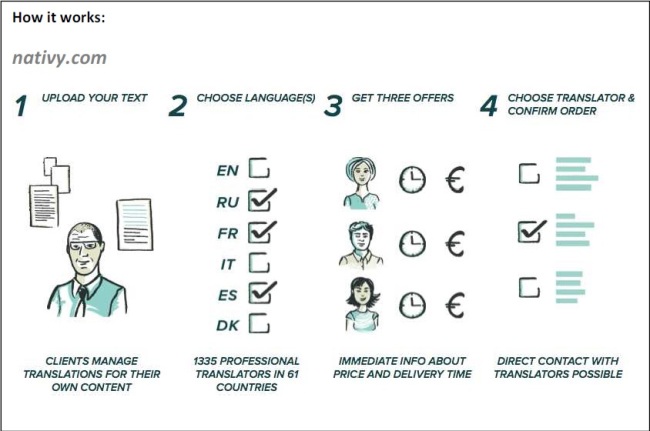Translations booked online quickly and easily – like hotel rooms. That is the vision of nativy, a Vienna-based translation agency. How does it work? Anja Drame of TermNet, the International Network for Terminology, has obtained a precise answer to this question.
Josef Brunner, born in 1977, got to know the translation market from a client’s perspective while he was still working in international sales. He was often asked for help when a translation was needed. A business administration graduate, he had studied for some time in Spain, France and the Netherlands and, in addition, had taught himself Russian. So friends and colleagues considered him a language expert.
But everything began to change when his boss showed him a text in Cyrillic script and asked him “what does this say?” Even though it did look like Russian, the text was in Macedonian. But his boss did not understand that.
Lack of understanding of foreign languages within companies, an obscure translation market and the complicated procedure of procuring translations often made his company – like so many others – hesitate to address multilingual communication needs.
“At the time I asked myself why it should be easier to make an online booking for a hotel room than for a good translation”, Brunner remembers. He was convinced that it was technically possible.
And so the idea was born. In 2011, together with a colleague and software developer, he founded nativy, a translation agency that offers good translations in a client-friendly way and at fair prices.
nativy’s founders Brunner (right) and Kerschbaummayr
What sets nativy apart is a special order processing system that generates an offer for the client within seconds. Nothing could be easier: the client uploads the text to be translated, which is then automatically analysed and matched against a complex database of available translators. Additionally, the client can also specify when the translation should be finished. The offer is prepared almost instantly – complete with a price and delivery deadline. Now all the client has to do is choose, and it’s done!
Brunner wants the system to be fair to translators as well. “We regard our translators as our capital. Each and every one of them is an independent professional and must be treated as such. Price dumping and cutthroat competition for the cheapest translation is a trend that will peter itself out. Our translators set their own prices.”
Brunner knows that clients do appreciate this. “For us it is about offering value for money rather than just low prices”.
This distinguishes nativy from many other translation agencies, where the management usually dictates the prices in a “like it or lump it” attitude towards the translators.
With their concept nativy has so far registered more than 1300 qualified translators – including for less common languages such as Armenian, Indonesian or Marathi.
Precautions are also in place to protect the confidentiality of documents. “Simply put, we are not a marketplace where the client’s text is sent all over the place until a translator says, “I’ll do it”.
Only the translator who receives the job sees the text. And the translator can ask the client questions about the text in a separate chat room.
Brunner is not afraid that so much direct contact could mean eventually losing his clients to his translators. “As a client, you always have a choice – you can look for a translator yourself who happens to be available, negotiate the price with them and so forth. If I, as a client, engage a translation agency it is because I do not want to or cannot do that myself. When the client then needs to have a text translated to five, six or more languages, that question no longer arises anyway”.
Quality is important to Brunner. In September 2013 his company was certified for the second time by the Language Industry Certification System (LICS) in accordance with the European Standard EN15038. This standard defines quality criteria specifically for translation service providers.
Among others, it determines what training and experience the translators must have. All translators who wish to work for nativy must meet these requirements. “We communicate this very clearly. And we examine it carefully. Applicants who fail to meet these basic requirements will not be included in our database. Just being able to speak one or more foreign languages obviously does not make you a good translator. But we find out very soon when someone fails to meet the criteria.”
For Brunner the standard EN15038 is more than just a helpful, practical guideline for how to manage his business. For him it is also a clear competitive advantage. “Today there are so many translation agencies that are EN15038 certified. These are very simple quality requirements. If a business is not certified, then the client really has to ask, why not?”
Brunner does not accept the argument that clients are not willing to pay the higher cost resulting from the translation-plus-review principle. “That accounts for just 30% of the price. But in return the client has the assurance that the translation is indeed of high quality and that it will not embarrass them”.
Technologically, nativy is modeled after Microsoft. Project management in the cloud – is that the future? “We are probably the first agency where you can place an order in Microsoft Word 2013, that is, Office 365 – very clearly a global approach. It is still very new, and Microsoft itself has only just started with it and will continue evolving in this respect.”
And nativy, too, will continue evolving. The next innovations are already on the drawing board. Josef Brunner does not want to give away too much yet. But if they are only half as innovative, we have every reason to remain excited.
AD

Leave a comment